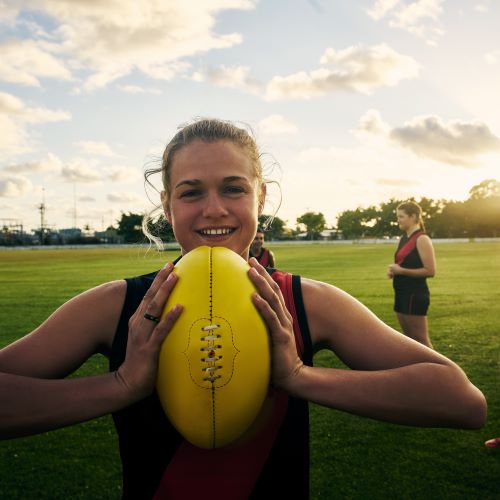17 April 2024
New research shows that despite ‘Matildas soccer mania’ gripping the nation during the 2023 World Cup, women footballers in general face an uphill battle gaining widespread acceptance in Australia and overcoming entrenched sexism.
Sport is still overwhelmingly considered a male domain – particularly codes that have traditionally been played by men, such as AFL.
Two recent studies by University of South Australia researchers demonstrate how the media, sponsors, funding bodies and marketers make it very difficult for elite AFL sportswomen to get the exposure and financial backing their male counterparts receive.
The findings show that older adults with more conservative attitudes view women as inferior athletes to men, which influences the wider public, according to UniSA PhD candidate Mackenzie Glazbrook who led the studies.
“These stereotypes are often present regardless of the quality of the sport being played,” Glazbrook says. “There can be an assumption that women’s sport will be less entertaining, which sometimes translates to low crowds.”
Despite being the most renowned sporting competition in Australia, the AFL only admitted women as professionals in 2017 – almost 160 years after the men’s game was launched.
In the past decade, there has been a 790% increase in women playing AFL in Australia, and female community teams have grown from 205 to 2540 since 2010, but the players still have a long way to go to reach parity with men.
The differences include a shorter season of 10 rounds in the AFLW, which does not allow all teams to play each other; a requirement to play in the warmer months to avoid conflicting with the men’s game; and players are relegated to lower-level ovals.
There’s also a big wage gap. The average AFL player salary is $519,000, whereas AFWL players are paid $82,000 on average.
“Our research shows that men, former competitive athletes and older adults are more likely to hold negative attitudes towards women’s sport,” according to co-author Dr Stephanie Webb.
Although the research found growing support for the AFLW, media interest remains low, particularly from commercial outlets. Minimal coverage means fewer opportunities to demonstrate their prowess and engage the public.
The results are a stark contrast to the fever that gripped Australia last August, with the 2023 FIFA Women’s World Cup making history in ticket sales and creating a media frenzy in Australia.
Glazbrook says the studies were done prior to the 2023 World Cup, and that nationalism may have played a role in their popularity, with teams representing entire countries, evoking a sense of unity.
“It has been very exciting to witness the success and popularity of the Matildas campaign and we are hopeful their success will flow through to women’s sport more broadly in Australia.
“The record-breaking consumer engagement for the Matildas emphasises how important media coverage and adequate financial backing is for women’s sport. What we know is that high quality and frequent media coverage engages the public and challenges the perception of men’s sport as superior.”
The researchers argue that increasing funding, wages and media support for AFWL teams would allow players to focus solely on their football careers and hone their skills without needing additional income to survive.
“We need to change outdated perceptions, and this would be a good start, along with the development of a full competition season.”
Notes to editors
“AFLW and the gender gap: an analysis of public attitudes towards the Women’s Australian Football League” is published in the Australian Journal of Psychology and involved a community survey with 171 people.
“Kick like a girl: a qualitative exploration into community perspectives surrounding the Women’s Australian Football League” is published in Sport in Society and included a community survey of 300 people.
The research was undertaken by Mackenzie Glazbrook, Dr Stephanie Webb and Dr Sarven McLinton, all from the University of South Australia.
…………………………………………………………………………………………………………………………
Media contact: Candy Gibson M: 0434 605 142 E: candy.gibson@unisa.edu.au
Researchers: Mackenzie Glazbrook E: mackenzie.glazbrook@mymail.unisa.edu.au; Dr Stephanie Webb E: steph.webb@unisa.edu.au; Dr Sarven McLinton E: sarven.mclinton@unisa.edu.au
